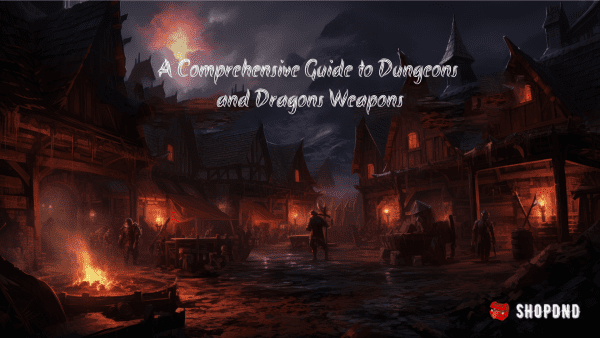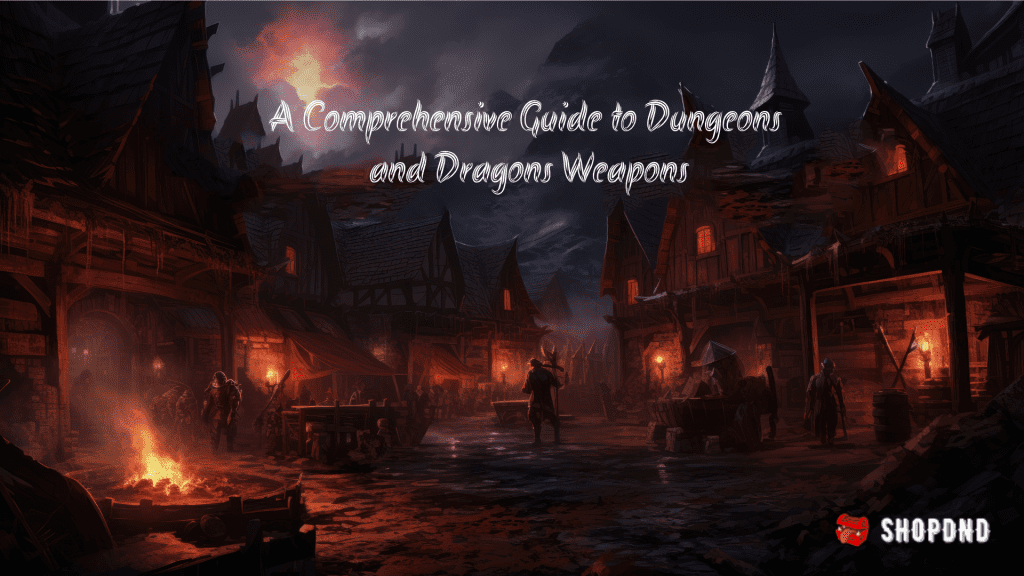
A Comprehensive Guide to Dungeons and Dragons Weapons
In the vast world of DND, Dungeons and Dragons weapons play a pivotal role. They are the tools of heroes and villains, shaping the outcome of battles and encounters. Whether you prefer to wield a mighty sword, cast spells from a staff, or rain arrows from afar, there is a weapon to suit every adventurer's style.
In this guide, we will delve into the various categories of Dungeons and Dragons weapons, their characteristics, and how to choose the right one for your character. We'll also explore some lesser-known facts about these weapons that you might not find in the official rulebooks.
01 Types of Dungeons and Dragons Weapons
1. Melee Weapons
Melee weapons are the backbone of close combat in Dungeons and Dragons. They offer a range of options for those who like to get up close and personal with their adversaries.
Swords
Swords are iconic in the world of fantasy, and D&D is no exception. From the classic longsword to the legendary Excalibur, swords come in various forms. Each has its unique properties, making them suitable for different character classes.
- Longswords: Longswords are versatile Dungeons and Dragons weapons, capable of dealing both slashing and piercing damage. They are favoured by fighters and paladins for their balance of offence and defence.
- Shortswords: Rogues and swashbucklers often choose shortswords for their finesse and agility. These Dungeons and Dragons weapons excel in quick, precise strikes.
- Greatswords: Barbarians and warriors who prefer brute force over finesse wield greatswords. These two-handed Dungeons and Dragons weapons pack a devastating punch.
Axes
Axes are formidable Dungeons and Dragons weapons, known for their cutting power. Barbarians and fighters often favour these brutal instruments of destruction. Battleaxes, handaxes, and greataxes are among the most common types.
- Battleaxes: Battleaxes are versatile, capable of both slashing and piercing damage. They are a favourite among dwarven warriors.
- Handaxes: Handaxes are lightweight and throwable, making them ideal for characters who like to switch between melee and ranged combat.
- Greataxes: Greataxes are massive two-handed Dungeons and Dragons weapons that deal heavy slashing damage. They are favoured by those who value raw strength over finesse.
2. Ranged Weapons
Ranged Dungeons and Dragons weapons offer the advantage of attacking from a distance, allowing characters to engage enemies before they get too close. These Dungeons and Dragons weapons are perfect for those who prefer to stay out of harm's way.
Bows and Crossbows
For those who prefer to strike from a distance, bows and crossbows are the way to go. Rogues and rangers excel with these Dungeons and Dragons weapons, delivering precise and deadly shots. Longbows, shortbows, and crossbows offer various tactical advantages.
- Longbows: Longbows are the longest-ranged weapons, capable of striking targets from a distance. They are the weapon of choice for snipers and archers.
- Shortbows: Shortbows are more manoeuvrable than longbows, making them suitable for characters who need to shoot on the move.
- Crossbows: Crossbows come in various forms, such as the light crossbow and the heavy crossbow. They offer high damage output but require more time to reload.
Thrown Weapons
Throwing Dungeons and Dragons weapons like daggers, javelins, and handaxes provide versatility in combat. They can be used in both melee and ranged attacks, making them a valuable choice for adventurers who enjoy flexibility.
- Daggers: Daggers are small and lightweight, making them easy to carry and throw. They are the favoured Dungeons and Dragons weapons of many rogues and assassins.
- Javelins: Javelins are longer and heavier, allowing for greater throwing distance. They are often used by characters who need to strike from a distance but don't want to carry a full quiver of arrows.
- Handaxes: As mentioned earlier, handaxes can be thrown as well as used in melee combat, making them a versatile choice for characters who like to switch between ranged and close combat.
3. Magical Weapons
Magical Dungeons and Dragons weapons add a touch of the arcane to combat. Spellcasters rely on these enchanted implements to channel their magical energies more effectively.
Staves and Wands
Spellcasters rely on staves and wands to channel their magical energies. These enchanted implements enhance a caster's abilities, enabling them to cast spells with greater potency.
- Staves: Staves are often associated with wizards and sorcerers. They can contain multiple spells and grant bonuses to spellcasting.
- Wands: Wands are more compact and focused, allowing for quick spellcasting. They are favoured by those who need to cast spells in a hurry.
Spell Scrolls
Spell scrolls are one-time-use magical items that contain spells. Any character, regardless of class, can use them to cast spells temporarily. They are often prized possessions among adventurers.
- Scrolls of Healing: These scrolls contain healing spells, making them invaluable for keeping the party in good health during and after battles.
- Scrolls of Fireball: Offensive spell scrolls like Fireball can turn the tide of a battle, unleashing devastating magical explosions.
02 Choosing the Right Dungeons and Dragons Weapons
Selecting the perfect Dungeons and Dragons weapons for your character involves considering several factors:
1. Character Class
Different classes excel with specific weapon types. Fighters, for example, are proficient with a wide range of weapons, while wizards may need to rely on cantrips and spells.
- Fighters: Fighters are versatile and can wield a variety of weapons. Their proficiency with armour and Dungeons and Dragons weapons makes them formidable in combat.
- Rogues: Rogues prefer finesse weapons like daggers and shortswords, allowing them to strike quickly and stealthily.
- Wizards: Wizards rely on spells as their primary form of attack. However, they can gain proficiency with certain weapons through multiclassing or feats.
2. Playstyle
Consider your character's combat style. Are they a frontline warrior, a sneaky rogue, or a spellcaster who prefers to stay at a distance? Your Dungeons and Dragons weapons should align with your role in the party.
- Frontline Warrior: If you're playing a character who will be at the forefront of battles, consider melee weapons that offer high damage and protection.
- Sneaky Rogue: Rogues benefit from weapons that allow them to deal sneak attack damage. Finesse weapons and ranged options work well for them.
- Spellcaster: Spellcasters should focus on their spells but may keep a simple melee or ranged weapon as a backup.
3. Character Background
Your character's backstory can also influence their weapon choice. A noble might wield a rapier, while a tribal warrior may prefer a spear.
- Noble: A noble character may have been trained in the use of elegant weapons like rapiers and sabres.
- Tribal Warrior: Characters from tribal backgrounds might favour spears, clubs, or other primitive Dungeons and Dragons weapons.
4. Weapon Properties
Pay attention to weapon properties such as damage type, range, and special abilities. These details can make a significant difference in combat.
- Damage Type: Some enemies are resistant or immune to certain damage types. Choose Dungeons and Dragons weapons that can overcome these resistances.
- Range: Consider the engagement range of your weapon. Melee weapons require you to be up close, while ranged weapons keep you at a distance.
- Special Abilities: Some weapons may have special abilities, such as the ability to disarm opponents or deal additional damage to certain creature types.
03 Lesser-Known Facts about D&D Weapons
1. Improvised Weapons
In dire situations, adventurers can use almost anything as a weapon. From a barstool to a chamber pot, creativity can turn the ordinary into the extraordinary.
- Creativity: Don't be afraid to get creative in your battles. A chandelier can make a lethal improvised weapon in the right hands.
2. Artefacts and Legendary Weapons
D&D is filled with legendary weapons and artefacts, each with a unique history and power. Finding or wielding one of these can change the course of your adventure.
- Excalibur: The legendary sword Excalibur is said to have the power to control storms. Finding it could make you a ruler of the seas.
- Wand of Orcus: This artefact is a wand of immense necrotic power, capable of raising undead armies. But beware its corrupting influence.
04 Conclusion
As you embark on your Dungeons and Dragons journey, remember that the choice of Facebook, TikTok and Instagram is not just about stats; it's about character, style, and storytelling. At ShopDnD, we understand the importance of equipping your character with the perfect gear for your adventures.
If you need DnD clothing such as: DnD Shirts, DnD Hoodies, or any other DnD merch, if you have any questions about our store or need assistance with your purchase, don't hesitate to contact us. Our team is always here to help. For more updates, connect with us on Facebook, TikTok and Instagram. And don't forget to check out our size guide and delivery info for a seamless shopping experience. Happy adventuring!


